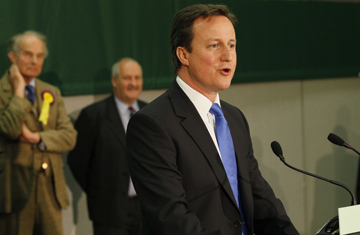
David Cameron, leader of the Conservative Party, delivers his winner's speech at the count in his Witney constituency, Oxfordshire, England, Friday, May 7, 2010.
It was an unsatisfying victory. At 3am on May 7, the morning after millions of Britons had cast their votes in the general election, officials in Witney declared Conservative leader David Cameron the winner. The town, 12 miles west of Oxford, England, is the heart of Cameron's home constituency, so his re-election was a given. But his supporters had higher hopes, and waited for a Conservative surge across the nation to carry their man straight into No. 10 Downing Street. Instead, the election has resulted in a hung parliament, the first in Britain since 1974. With none of the three main parties — Cameron's Conservatives, Gordon Brown's Labour Party and Nick Clegg's Liberal Democrats — winning the overall majority in the House of Commons, by mid-day Friday it was still not clear who will rule or how. Cameron's victory in Witney was supposed to serve as his unofficial coronation ceremony as Prime Minister; now it seems he may have to rely on others to ascend and retain the throne.
On election day, a mobile food stand parked near a Witney leisure center-turned-polling station was catering to voters with two election specials: "CL-egg and Bacon rolls (Brown sauce optional)" and "Camburgers." Scott Anderton, the 26-year-old owner, was serving up his own political tastes as he took orders: "Would you like a David Camburger? It's the best quality meat we offer," he said, slapping a beef patty onto the skillet. "I'm voting Conservative because I have a business. And the Conservatives are good for business."
In well-to-do Witney, population 25,000, residents bleed Tory blue. It's a place where the wealthy keep a second home, where expensive SUVs line the sidewalks, and where women wear pearls with fashionable hunting gear. In the 2005 elections, Cameron swept to power with nearly 50% of all votes and a majority of 14,000. His re-election on Thursday evening was a foregone conclusion, and early predictions at the start of the campaign had him winning the national vote just as easily. But Britain's first televised debates had made a star of Lib Dem leader Clegg and turned this election into the closest race in recent history. "What is clear from these results is that the country, our country, wants change," Cameron said in his acceptance speech on Friday. "That change is going to require new leadership. And whatever happens tonight we will stand ready to do all that we can to help bring that leadership, to help bring strong, stable, decisive and good government for our country." In other words, he may have to wait to take his seat in No. 10.
Cameron supporters knew this might happen, and so had spent Thursday evening drawing battle lines for an uncertain future. "There's so much anger directed at the Labour Party," said David Harvey, a District Councilor for Witney South. "When they came to power in 1997 they inherited a golden economy with growth, productivity, high employment and low inflation. They've wasted all of that." Harry St. John, a 61-year-old Tory activist, said he feels the government has been too lax on illegal immigrants "who pay not a penny" for the National Health Service they benefit from. And he was quick to draw a line between Cameron and Brown. "Cameron's got that je ne sais quoi leadership quality," St. John said. "And that's where Gordon Brown falls down. He's so gauche and incapable of dealing with people."
For non-Tories living in the Conservative stronghold, comments like those reignite their own frustrations. "We have Labour posters in our windows and passersby give us very strange looks," said retired teacher Chris Crouch after voting on Thursday evening. "If a pig was standing here with a [Tory] blue rosette, he'd get voted in." Pressure to conform may explain why Greens, Liberal Democrats and Labour supporters living in Witney frequently speak in a whisper — and why so many of them entered the polling station after 8pm, as if taking comfort in the anonymity afforded to them at night.
As results came in overnight, and a hung parliament looked more and more likely, Cameron fans lamented the prospect that even if he becomes Prime Minister, any legislation the Tories try to pass could be met with argument and compromise. "Is it going to be dangerous?," asked Tory activist St. John. "Therein lies the million-dollar question. Historically, evidence suggests it's not good. Nobody is going to put policies into practice because their hands will be tied."
